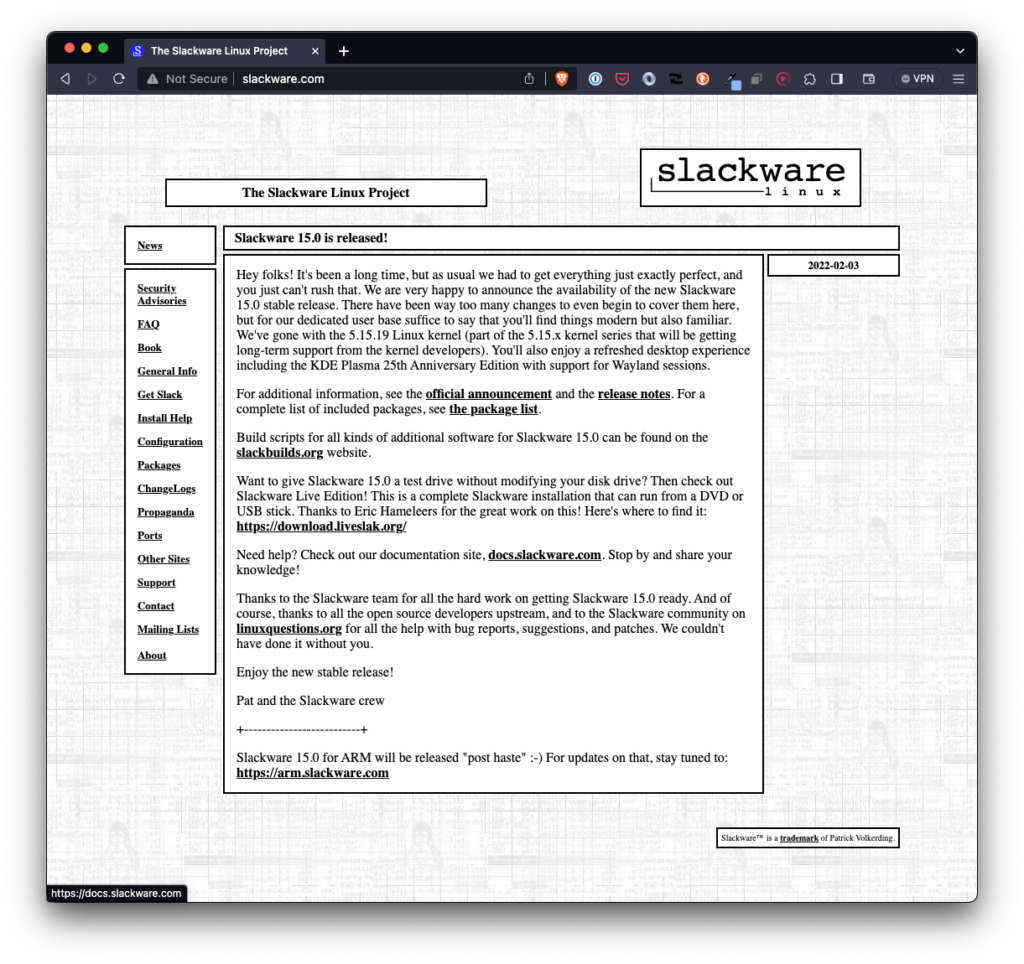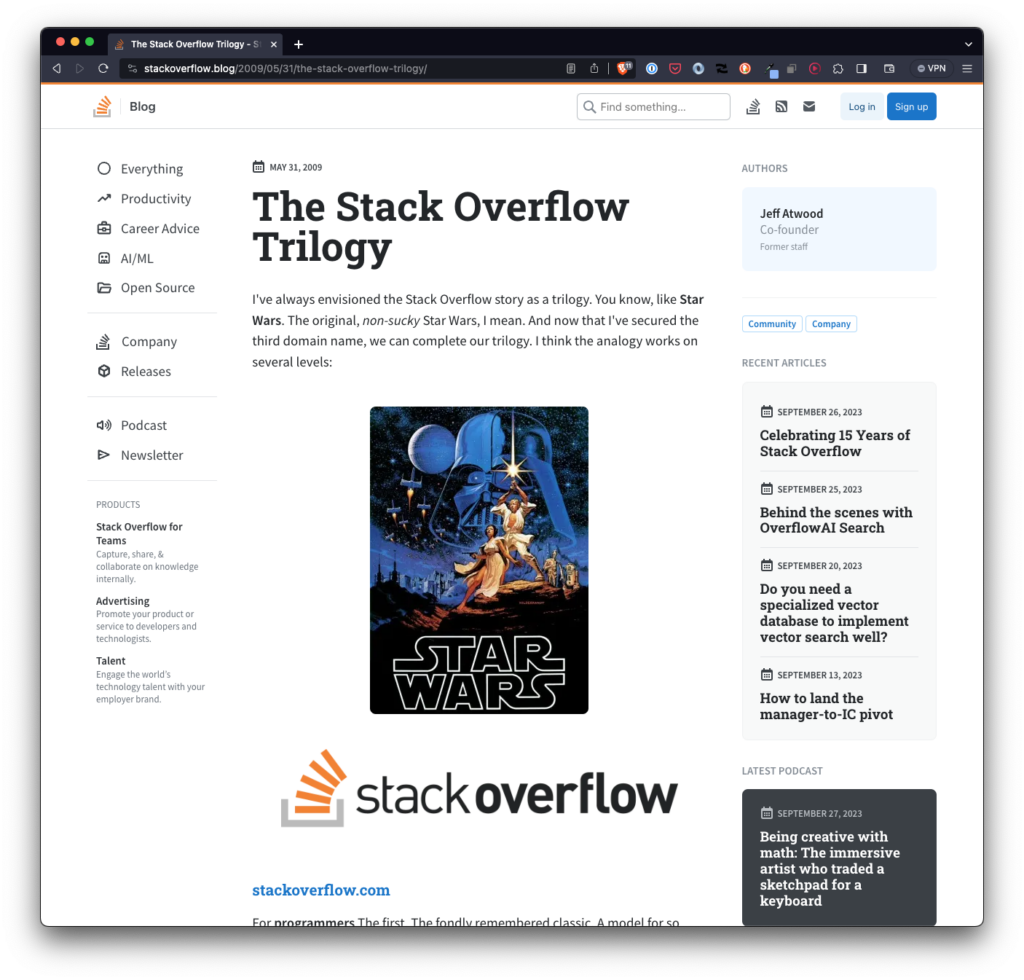A few days ago, Carl and I were talking about the impact that ChatGPT and related technologies have had on those of who spend – or spent – a lot of time writing long form articles showing how to achieve things within the context of software development.
Both he and I, among others – perhaps including some of you who are reading this post or regularly read this blog – have been around long enough to remember what it was like growing up online, learning how the machine works, how to write code, and perhaps even studying it in both high school and college, and maybe beyond that.
The 90s
For me, it was a combination of AOL, the the programming forums, VB3, and then onward and upward to other languages, operating systems, and platforms from there. True story: The first copy of Linux I ever received was Slackware that someone I met in IRC sent to me via USPS. The site doesn’t look enough different today.

So many afternoons, nights, and evenings were spent hopping between playing games like King’s Quest (Six is the best and I’ll fight you for it) and then signing online to see what certain people were building (such as a TCP/IP checkers game built fully in Visual Basic) to random proggies people were using to manipulate AOL, and from trying to wrap my head around C++, to trying to make sense of Dan Appleman’s Programmer’s Guide to the Win32 API.
The 00s
Fast far forward to the early two thousands and sites like Stack Overflow come online (from the minds of long-time bloggers Joel Spolsky and Jeff Atwood, no less) and begin having perhaps the largest scale and gamified way to get your programming-related questions answered quickly.
In fact, I remember listening to the podcast on my iPod Shuffle while running through the suburbs of the north Atlanta metro area. They’d talk about how they were discussing certain aspects of the site from an object-oriented programming standpoint, the technology stack they were using – which was .NET – and they were using Subversion as their version control system.

And I’m old enough to be one of the double-digit user accounts. And I remember them growing into what was originally called The Stack Overflow Trilogy. It was a really cool time to be a young software developer working in web application development.
Today
All of this is to say:
I don’t recall a single new set of sites and/or technologies being introduced that so quickly impacted what those of us who do what we do for a living.
On Blogging
Sure, certain technologies or libraries or languages or tools have come and gone, but when I think about major inflection points of utilities that have impacted software developers, Stack Overflow and ChatGPT (along with its related technologies such as Copilot) are the first thing to come to mind.
I’m shooting from the hip as I’m drafting this late at night and should be giving this more thought, but I digress.
Anyway, during the conversation with Carl, he made the following claim:
I think ChatGPT wrecked our type of content
I’ve been rolling it over in my mind for the past few days not so much because I disagree – I actually firmly agree – but I’ve been thinking about the following two points:
- It’s paradoxical. Bloggers wrote the content that helped train a massive LLM that ultimately negate the need for that kind of content. Granted, we could continue to feed the machine, so to speak, but LLMs can learn from themselves given the right interaction.
- The goal was never to provide a quick way to copy and paste a solution, but how to learn how to solve a problem when you weren’t sure how to approach it. (And this is something that I think serves anyone in the field of applied computer science well.)
When you’re someone who enjoys writing about technical concepts for yourself and others, the ultimate goal isn’t to show someone how to quickly do something. More so, it’s to show how to approach problem solving in the abstract and to understand the tradeoffs of various solutions.
On Social Media
Then I got to thinking about all of the people in WordPress I’ve met over the years, then I got to thinking about all of the people in adjacent groups I’ve met over the years. Those work work in:
- backend languages,
- front-end languages,
- content creators,
- podcasters,
- and so on.
So I decided to hop back on to X/Twitter for a bit to see how those people have been using the platform since ownership changed hands earlier this year.
And what I found during my, what you may call, straw poll was that there’s a lot of people who haven’t abandoned the platform at all. Instead, they subscribe for access to the premium features of the platform, who are writing long form content, who are sharing longer form content than I think we’d more likely see on some blogs just five years ago.
So then I brought all of this back to what I’ve traditionally written about and in the field in which I work, and I’ve noticed that there are a lot of people spending a lot of time writing about development work as it relates to WordPress on X/Twitter rather than on their blog.
And here’s why that strikes me as strange:
Old school tweeting was one thing because it included short statements that felt more like parts of a conversation. A very loud, boisterous, crowded conversation, but a conversation of sorts nonetheless.
Now, though, people are writing essays on their premium accounts about content related to a platform that targets the democratization of publishing. An essay does not a conversation make.
Further, publishing content on a platform about the software on which you work that aims to give people the goal to publish content so they can maintain it seems incongruent.
I don’t think anyone should have to make this claim but I’m not someone who cares one way or the other who owns X/Twitter or what’s going on with it from a socio-political-or-economic perspective. The observations I’m making wouldn’t matter who owns it.
Bringing It All Together
So how do I bring the various and seemingly disparate thoughts on all of this together to try to make a cohesive article? I’ll do what I can.
- Writing about software development and trying to provide quick solutions to common problems are not the same thing.
- Writing long form articles about the concepts in software development and looking for an answer from ChatGPT or related services are not related.
So the first question seems to come to something like:
- When people are given the choice to choose between the two, will they search the archives aggregated via RSS first or go to ChatGPT first?
Though the goals of this question are not mutually exclusive, I think getting an answer fast often outweighs the “I’m looking for an answer but it was neat to also read about someone else’s situation while searching for it.” And this is why ChatGPT has “wrecked” some of the content a bunch of us typically write.
It’s not because we don’t want to write it (and no one is stopping us), but it’s hard to know just how many people come for the content and stay for the answer versus come for the answer and stay for the content.
The answer, then, seems to lie somewhere in between either continuing to write as usual, which is a completely viable option, or do what content creator types do and bring the content to the table in a way that’s compelling enough to keep people coming back (or turning in, or watching, or smashing that subscribe button and remembering to hit the bell).
The second observation, though, is a bit less clear to me. Before X/Twitter changed hands, people were already involved in a number of different areas online such as Slack channels for Post Status or The WP Minute, Facebook groups, but they also tended to maintain their own site while sharing their shorter content on X/Twitter (for reasons that I’ve already covered).
Now, the whole thing is all over the place:
- Some are spending a lot of time writing long form content on X/Twitter,
- Some are participating in various Slack channels,
- Some are participating in various Facebook Groups,
- Some are blogging,
- Some have pulled back from the social web,
- Some are doing none, multiple, or all, of the above.
Having choice is fine and picking where to hang out is great – it’s the whole go where you feel most welcome kind of thing – but the degree and/or ways in which many of us have changed in 2023 alone is really something to observe.
Where We’re Headed Isn’t Clear
And, as I said at the outset, the solution to this isn’t clear. If I had to summarize my take it would be something like this:
Long form posts for those on X/Twitter has increased this year and the amount of content people are sharing on their own blogs and syndicating it to X/Twitter has decreased.
I have to leave it at that for now because I don’t know what to make it of it. Maybe it’s just the way it is.
Anyway, Carl also made the comment in our conversation:
I think there’s still space for teaching and writing about concepts
And I agree with this, too. The thing is, I don’t think the way we’ve historically done is it the way to do it moving forward. I won’t be the guy who’s writing his thoughts on X/Twitter (not as a protest or anything) because I don’t see the medium has particularly useful for that in the long term.
I still think blogging and ultimately publishing content on your own property and syndicating it out to social networks is ultimately better than inverting how it’s done (though that’s what’s happening right now).
People can read the content and then take the social aspect of to social media. Or they can drop an email in our inbox. Or they can consume it and move on.
Regardless, how the content is produced is presented is likely the next challenge for those of us who have historically done long form technical writing. And I don’t know what that looks like right now.
Exciting times ahead.

